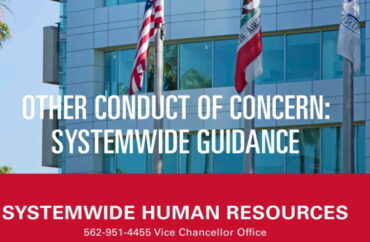
A free speech group has called on the California State University system to revise its new “Other Conduct of Concern” discrimination and harassment policy, calling it overbroad and unconstitutionally vague and arguing it would impermissibly chill expression.
“We urge you to reconsider this guidance and ensure no members of the CSU systemwide community are subject to investigations or discipline for engaging in constitutionally protected expression,” the Foundation for Individual Rights and Expression wrote to CSU leaders.
The five-page Dec. 30 memo from the nonpartisan nonprofit focused on defending free speech told leaders of the 23-campus system the policy is a legal minefield.
“It is deeply concerning that this CSU systemwide guidance explicitly targets ‘behaviors that do not violate CSU policies or local, state, or federal laws and are therefore not subject to disciplinary action.’ This necessarily means that the overwhelming majority of behaviors that will be the subject of this scheme are protected under the First Amendment,” the letter states.
CSU trustees verbally affirmed their support of the policy at their December meeting. Currently in draft form, it is expected to be reviewed by the California Auditor this month.
“This policy will not chill free speech, it will put it into a deep freeze,” said San Diego State University English Professor Peter C. Herman in an email to The College Fix. “Unless it is reversed, this new approach to speech will turn SDSU into an Orwellian dystopia.”
The “Other Conduct of Concern” policy aims to oversee discrimination and harassment complaints that do not violate CSU policies or local, state, or federal laws. It requires employees to address any and all reports of “verbal abuse,” “intimidating behavior,” “microaggressions that are not pervasive,” “bullying,” “hostile language,” and “acts of bias.”
Cal State’s public affairs office did not provide a comment to The College Fix regarding FIRE’s letter despite emails and a phone call. Its trustees office and office of the chancellor also did not respond to The College Fix’s emailed requests for comment.
Under the “Other Conduct of Concern” policy, complaints will be tackled through a seven-step process: acknowledgment; initial review; support for the “reporting party”; factfinding; communication; action; and follow-up. Reports require complaints be investigated with “corrective action,” such as re-education trainings and restorative justice actions.
FIRE’s letter argues that the U.S. Court of Appeals for the Ninth Circuit “has established that investigations cross the threshold from permissibly gathering information to impermissibly chilling speech when the process ‘would chill or silence a person of ordinary firmness from future First Amendment activities.'”
The letter also argues the policy is “unconstitutionally vague.”
“When parsing through the guidance, students are left wondering the meaning of terms such as ‘microaggressions,’ ‘bullying,’ ‘bias,’ ‘intolerance,’ ‘verbal abuse,’ and ‘intimidating behavior.’ Furthermore, the guidance implores community members ‘to communicate with sensitivity and care’ while not elaborating on what those terms mean,” it states.
“…Absent any clarification in the text of the guidance, there is simply no way of divining the meaning of this exceedingly-vague language. As a result, the language of the guidance cannot survive constitutional scrutiny.”
An op-ed by San Diego State University’s Professor Herman had also criticized the policy, arguing the “CSU Administration wants to set up a complicated system to police ‘OCC,’ and everyone is under surveillance: ‘Individuals who experience or witness OCC’ can report it.”
“…It’s astonishing how tone deaf this is,” states the Times of San Diego op-ed. “At a time when America has shifted to the right, when a growing number of people in the US have little to no confidence in higher education in good part because of rampant violations of free speech, when the President-elect has vowed to issue an executive order punishing colleges and universities that do not support free speech, the CSU proposes an Orwellian policy in which everyone is under suspicion, the accused have next to no rights, and almost anything you say can land you in deep trouble.”
MORE: New CSU policy to police complaints of bias, microaggressions, intimidation, hostile words
Like The College Fix on Facebook / Follow us on Twitter






Please join the conversation about our stories on Facebook, Twitter, Instagram, Reddit, MeWe, Rumble, Gab, Minds and Gettr.